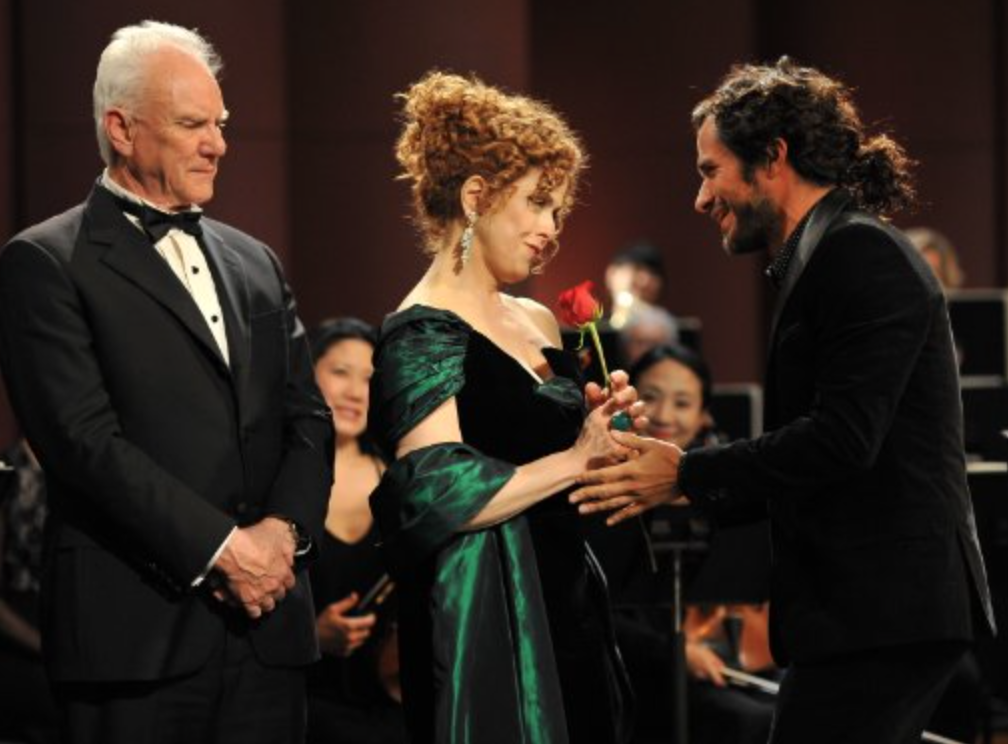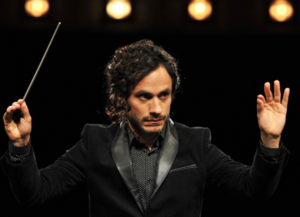 Ever since she warbled “You Belong to Me” in 1979’s “The Jerk,” I’ve had a soft spot in my heart for Bernadette Peters. With her cupid bow mouth and Mae West-on-helium delivery, the star of screen and stage boosts everything in which she appears, even the cruddy 1989 Clint Eastwood vehicle “Pink Cadillac.” So it speaks volumes that the Tony-awarded singer plays one of the few non-musicians in “Mozart in the Jungle,” the Amazon original series about New York’s classical music scene. Just talking about it converts me into an overbearing mother: Dear, you’d look so nice if you stood up straight and brushed the hair out of your eyes. Here is a show yet to capitalize on its natural assets.
Ever since she warbled “You Belong to Me” in 1979’s “The Jerk,” I’ve had a soft spot in my heart for Bernadette Peters. With her cupid bow mouth and Mae West-on-helium delivery, the star of screen and stage boosts everything in which she appears, even the cruddy 1989 Clint Eastwood vehicle “Pink Cadillac.” So it speaks volumes that the Tony-awarded singer plays one of the few non-musicians in “Mozart in the Jungle,” the Amazon original series about New York’s classical music scene. Just talking about it converts me into an overbearing mother: Dear, you’d look so nice if you stood up straight and brushed the hair out of your eyes. Here is a show yet to capitalize on its natural assets.
A chief asset is the story behind the show: Blair Tindall’s 2005 eponymous memoir. After cutting her losses and getting a journalism degree, the professional oboist wrote this clear-eyed, white-knuckled account of the economic and emotional realities facing classical instrumentalists today. Both bleaker and more libidinous than the show, the book spares nothing and no one – from badly structured arts education initiatives to preening benefactors to the substance abuse, narcissistic injuries, and erotic misadventures of Tindall and her peers. Through her eyes, this seemingly austere subculture is as degenerate as a heroin den; she herself made headlines after dumping two bottles of weed killer in “science guy” Bill Nye’s garden when he left her after seven weeks of marriage.
In the series, Tindall’s stand-in is Hailey (Lola Kirke, sister of “Girls” star Jemima), a talented twenty-something oboist who is languishing in the netherland of freelance gigs. But while Tindall never pretended she was a saint – the book doubles as a kiss-and-tell in which the author’s many sexual liaisons both hurt and helped her career – Hailey is a good girl, almost dully so. In the season pilot, she is befriended by Cynthia (Saffron Burrows), a siren of a cellist who scores her an audition for the fictional New York Symphony. When Hailey blows the opportunity, she becomes assistant to manic pixie dream boy conductor Rodrigo (Gael García Bernal), loosely based on the real-life conductor Gustavo Dudamel.  Though it’s actually Cynthia who beds her colleagues – she’s the mistress of bad boy conductor emeritus Thomas (Malcolm McDowell) – everyone assumes the worst of comely Hailey. A first chair oboist (Debra Monk) outright refuses to mentor her. The scarcity mentality of this world is well illustrated, both in its infighting and in the juxtaposition between the threadbare musicians and their extravagantly well-off patrons, many of whom belong to the most powerful families in the United States.
Though it’s actually Cynthia who beds her colleagues – she’s the mistress of bad boy conductor emeritus Thomas (Malcolm McDowell) – everyone assumes the worst of comely Hailey. A first chair oboist (Debra Monk) outright refuses to mentor her. The scarcity mentality of this world is well illustrated, both in its infighting and in the juxtaposition between the threadbare musicians and their extravagantly well-off patrons, many of whom belong to the most powerful families in the United States.
Much of this first season follows Hailey’s efforts to secure a seat in the symphony; the contrast between her status as queen bee in hipster Brooklyn and as no-woman on the orchestra totem pole is spelled out in excessive detail. Best are scenes in which she plays “reactress” to the more florid personalities around her. Rodrigo in particular is a delight. His mad-hatter glee stems from an artistic commitment that we buy, and his vision quests through the city and upstate are photographed with a glittering intimacy. Other bolts of magic realism prove more wearying: Mozart’s ghost is apparently quite a bore, as is Thomas’s toothless nervous breakdown after he cedes his post to Rodrigo and retreats to Cuba.
Series creators and cousins Roman Coppola and Jason Schwartzman clearly have a lot of ground they’re keen to cover – their grandfather was a known flautist and composer – so they can be forgiven for occasionally stumbling in their breathless pacing. Schwartzman’s high-octane deadpan humor helps; sly edits and lickety-split portraits of industry eccentrics recall the work of his longtime collaborator and mentor, Wes Anderson, as well as his own on-screen persona. (Schwartzman also has a cameo as a blogger critic.) But it’s Peters who once again saves the day. As orchestra board chairwoman Gloria, her saucer-eyed subversion softens the hawkishness of the character as written and anchors the too-many-cooks-in-the-kitchen plotlines that threaten to run amok.
It’s no wonder that the middle lady between the money and the art is the series’ voice of reason. Thus far, “Mozart in the Jungle” succeeds most when it pulls back enough to reveal the economic and creative ironies plaguing classical music since its inception. Now that the show’s been renewed for a second season (Amazon made the announcement last week), perhaps it will ripen along with Hailey’s career into something more closely resembling Tindall’s memoir. More abbandono, less staccato – just what the doctor ordered.
This was originally published in Word and Film.
